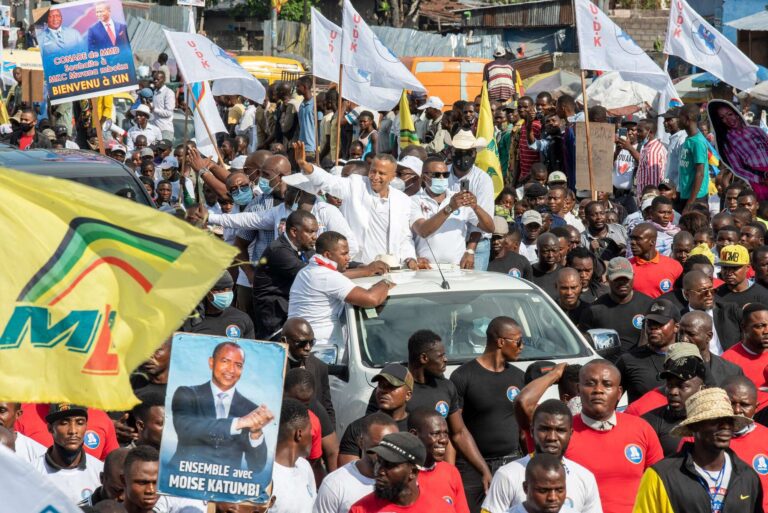A bill intended to strengthen election candidacy rules in the Democratic Republic of Congo is seen as a tool to block President Félix Tshisekedi’s second term ahead of elections scheduled for December.
The bill is one of several pieces of legislation that will be debated during the September session of the Congolese parliament, which often also discusses budgetary rules at this time of year.
Parliament is expected to discuss the project called “Tshiani Law”, named after its author Noël Tshiani, a 65-year-old economist who worked at the World Bank and ran for president in 2018.
One of the provisions of the bill is that only Congolese born to Congolese father and mother can be appointed to positions of sovereignty or as officers of the state, in particular president, prime minister, in the courts and tribunals, the ministries of finance, defense and security. .
Read: Kabila plays a wait-and-see attitude on elections in the DRC
Majority MP Pitshou Nsingi Pululu, who supports the project, said: “We want to lock about 250 positions that we consider part of the sovereignty of our country. »
The bill was initially proposed in July 2021 but did not pass. His proposals follow a pattern seen in African countries, but most of which have excluded people with dual nationality from state officer positions, rather than targeting those of mixed parentage.
In Kenya, for example, a president, minister, Kenya Defense Force soldier, MP, County Assembly member and ambassador cannot hold two passports. The president should be Kenyan by birth, without specifying the nationality of parents, while members of the judiciary and other independent commissions could be drawn from Commonwealth nations, including the East African Community.
Yet some people in DR Congo believe Tshiani and Pululu’s initiative is a strategy to keep Tshisekedi’s rivals such as Moïse Katumbi, who has mixed heritage, out of the presidential race.
President Tshisekedi had avoided commenting on the bill until recently during a public reception.
“I did not give my opinion so as not to get involved in the controversies that this law has sparked in the Congolese political class,” declared the Congolese leader. “Tshiani is a Congolese – until proven otherwise – who has the right to think what he believes is good for his country. It’s his right, we can’t judge Tshiani here because we are in a democracy where everyone has the right to express themselves.”
Read: Tshisekedi’s headache in his quest for victory in the next presidential elections
“I do not think that being born to a Congolese father and mother is a sufficient criterion to serve one’s country in a loyal, faithful and appropriate manner. Because, even the most recent history of our country shows us that there were Congolese whose fathers and mothers participated in the ruin of this country, so it is not a criterion, and those who think that it is a criterion are free to argue.”
The “Tshian bill” was rejected by Congolese opposition parties and Catholic clergy called it discriminatory.
Mr. Katumbi, once an ally of President Tshisekedi, left the coalition a few months ago, fueling suspicions that the bill targeted him. He announced that he would be a candidate in the presidential election scheduled for December 20.
Candidate registration closes on October 8.
Mr Katumbi, a wealthy businessman, is best known for his leadership of the Congolese football club TP Mazembe based in Lubumbashi, in the south of the country. His father had Greek and Italian roots and was Jewish.
He served in Katanga province as governor for eight years and supported Tshisekedi’s presidency.
In December 2022, he fell out with President Tshisekedi and left, declaring that “President Tshisekedi’s record is very bad and chaotic”.
“I gave advice internally, I proposed a list of tasks which were not taken into account,” he said on the day of his departure and declared that he would be a candidate for the post. presidential election.
Several ministers from his camp also resigned from the government. Among them was the late Chérubin Okende, killed on July 13 in circumstances which remain unclear to this day.
Read: Former Congolese minister turned opposition MP found dead
Tensions are high between the Katumbi and Tshisekedi camps. Some people close to Katumbi also have cases pending in court.
Salomon Kalonda, a close adviser, is on trial before the Kinshasa military court, accused of collusion with Rwandans in preparing a coup.
A deputy from the Katumbi camp, Mike Mukebay, is in prison for insulting the head of state.
In 2018, 21 candidates ran for president. According to the electoral law and the constitution, candidates must be of Congolese nationality by birth; be at least 30 years old; enjoy all their civil and political rights; hold a higher education or university degree or have professional experience of at least five years in the political, administrative or socio-economic field; be eligible to vote or be identified and registered when submitting your candidacy.
The declaration of candidacy must include the following elements: A certificate of nationality; A valid criminal record extract; A photocopy of the voter card; A receipt for payment of the non-refundable application fee of 160,000,000 Congolese francs ($100,000) paid to the public treasury; A certified photocopy of the higher or university education diploma or certificate in lieu thereof or proof of professional experience of at least five years in the political, administrative or socio-economic field.


